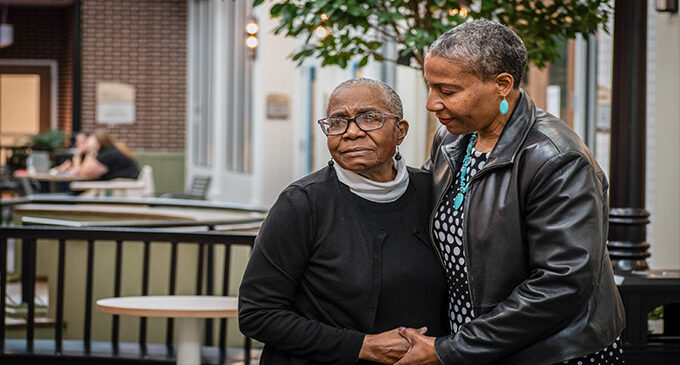Life changes when mother and daughters switch roles
Carrie (on left) and Tamra at Senior Services Generations Center.

By Nancy Bruce
Tamra was only five years old when her father died, leaving her mother, Carrie, to raise her and her older sister, Terri, alone in Cleveland, Ohio. From early on, in Tamra’s eyes, Carrie was a powerhouse and her “she-ro.” Carrie modeled determination, strength, and citizenship for her girls as she stepped up as a leader in their church, a Girl Scout district leader, and a swimming instructor. She also demonstrated her compassion for her community by opening their home (which the girls called “the hotel”) to folks without families.
While Tamra was growing up, Carrie went back to college, knowing that furthering her education would improve her ability to provide the type of life she wanted for her children.
As an adult pursuing a career as an educator, Tamra kept the lessons about strength, hard work, and caring for others she learned from her mother close to her heart. Things seemed ideal until she received a call that would begin to change her life. A friend shared that she was worried because of changes in Carrie’s behavior. Tamra took Carrie for a checkup and was relieved that the results seemed to show no memory issues. Not long after, Tamra married and moved to North Carolina.
Her fear about her mother’s memory and health returned when she noticed Carrie repeating stories over and over during their phone calls. It grew worse when she realized her normally organized and efficient mother had begun losing valuable items and making poor decisions, including financial ones. Tamra was alarmed when she learned that Carrie had even been scammed several times.
Tamra went back to Cleveland to find that Carrie’s mail was piling up, her bank accounts were in disarray, and she just didn’t seem to be the person Tamra knew as her mother. They made an appointment with another doctor who administered the “clock test” which asks the patient to draw hands on a clock to indicate a specific time. Carrie was unable to do it. “I was devastated. I realized in that moment that my she-ro’s cape had holes,” Tamra recalls.
Life soon changed for their entire family as Tamra and her sister Terri seemingly switched roles with their mother. Carrie told Tamra, “I need you to help me now.” They were now responsible for taking care of the woman who had cared for them.
Carrie moved in with Tamra and her new husband in North Carolina. Terri became the power of attorney and took on the responsibility of Carrie’s finances while Tamra became their mother’s full-time caregiver and medical advocate – a role much bigger than Tamra could have anticipated.
Tamra devoured as much information as she could find about memory loss and discovered “Caregiver College,” a Maya Angelou Center for Health Equity program administered through Senior Services and the Wake Forest University College of Medicine, which showed her that much of what she was seeing in her mother’s behavior was, indeed, a part of the dementia journey.
Tamra’s advice for others falling into caregiving: most importantly, pace yourself. Learn everything you can, be patient, and accept that you cannot be perfect. Seek out and accept help; there are a lot of trained people plus rich, engaging programming geared to older adults with memory issues.
Tamra also learned that caregiving is exhausting and there is no shame in seeking help. “It was a hard lesson – if I don’t take care of myself, I cannot be the best support for my mother.” She eventually found one source of support at Senior Services Williams Adult Day Center.
The Williams Center has been a great benefit for both Tamra and her mother. It provides a safe and enjoyable place for Carrie during the day, while Tamra gets relief and time to herself. “When I went to pick her up from “school” (their playful name for the Williams Center) the first day, she told me to wait, “I’m learning about this groundhog!” Tamra shared with a chuckle. “She didn’t want to leave because the programming is so engaging.” The fact that there are professionals on staff trained to care for memory issues makes Tamra feel very comfortable. The Williams Adult Day Center also feels like a mini-care support group for her.
“At first, I felt very alone going through this, as though I had no help, But the Williams Center and the Generations Center in general provide me with friends who share experiences, information, and some laughs,” said Tamra.
For more information on the programs offered by Senior Services, please visit www.seniorservicesinc.org.
Nancy Bruce is the engagement assistant for Senior Services.









